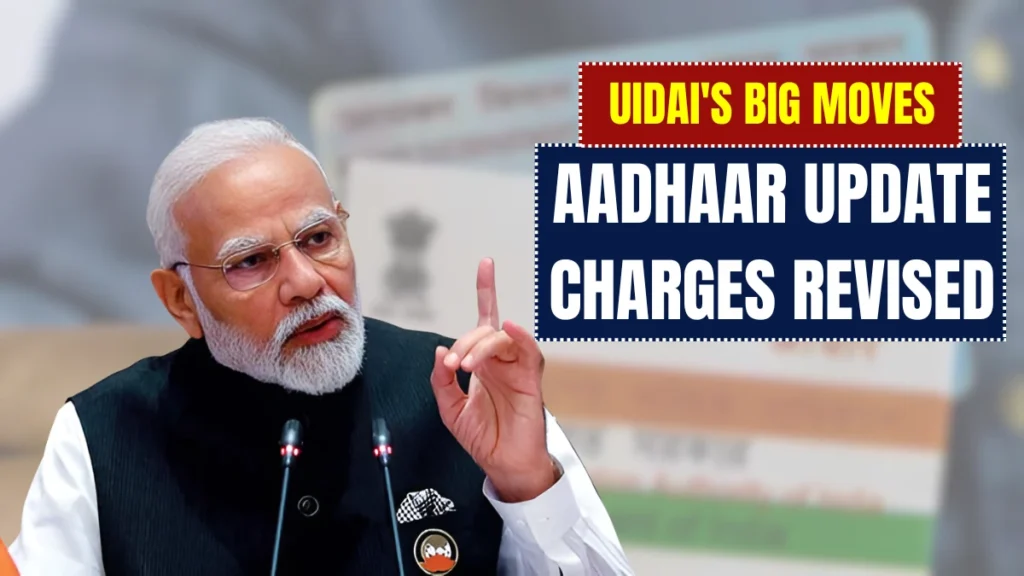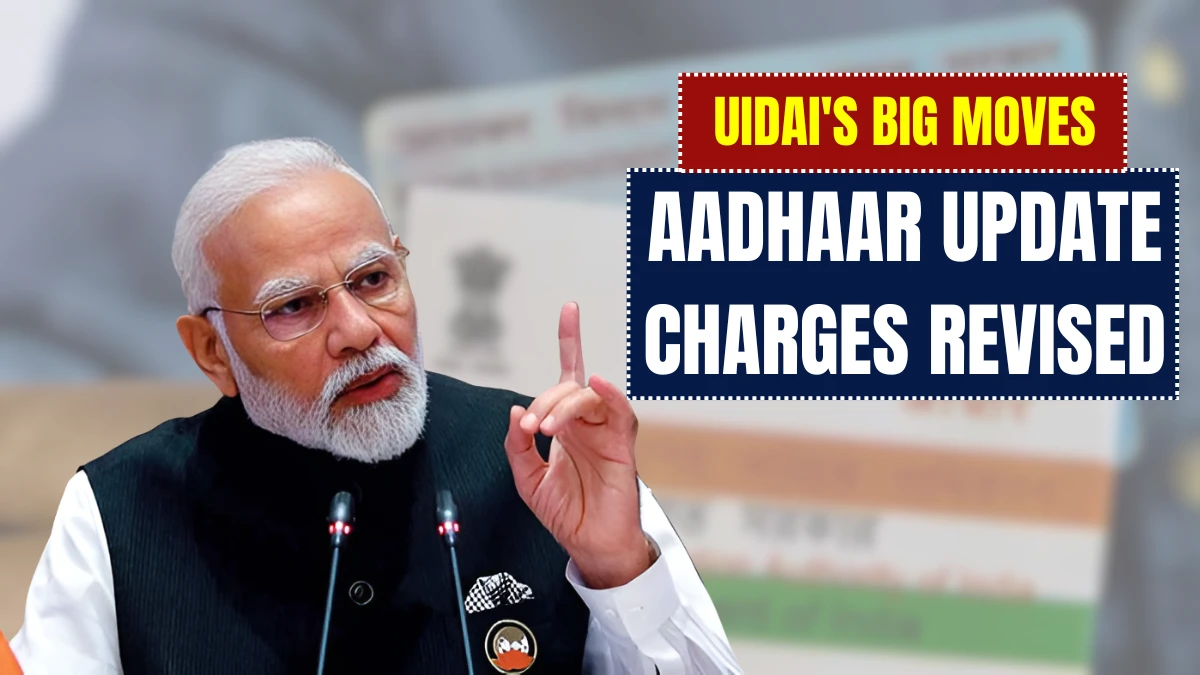In recent developments, the Unique Identification Authority of India (UIDAI) has announced important changes regarding Aadhaar updates and the mandatory linking of PAN (Permanent Account Number) with Aadhaar.
These moves are part of the government’s efforts to enhance the efficiency of the Aadhaar system and tighten regulations around tax compliance. This article explains the changes and their implications for citizens, as well as the necessary steps to stay compliant.

Revised Aadhaar Update Charges
The UIDAI has revised the charges for updating Aadhaar details, a move that will affect a large number of individuals. Previously, updates to Aadhaar were either free or available for a minimal fee. However, with the new changes, there are charges associated with certain updates to your Aadhaar data. These updates could include changes to demographic information such as name, address, date of birth, or gender. In addition, biometric updates like fingerprints or photographs will now also incur a fee.
While these charges may seem inconvenient at first, they are intended to help sustain the Aadhaar system. The government has implemented these fees to cover the operational and technological costs of maintaining the massive Aadhaar database. It is important to understand that these charges remain relatively low, and the update process is still accessible through various Aadhaar centres across the country. Despite the added cost, updating Aadhaar information continues to be a simple and efficient process.
Citizens should also be aware that frequently updating Aadhaar details may lead to cumulative costs. However, it is crucial to regularly verify the accuracy of your Aadhaar details to prevent any need for repeated updates. If your details are up to date, you can avoid additional fees and ensure that your Aadhaar remains valid for all purposes.
Mandatory PAN-Aadhaar Link
In addition to the revised Aadhaar update charges, UIDAI has made the linking of PAN with Aadhaar a mandatory requirement. This change comes as part of the government’s ongoing efforts to streamline tax-related processes, reduce tax evasion, and ensure the integrity of the tax system. For many individuals, linking PAN with Aadhaar had been a voluntary process, but with the new directive, it has become a compulsory step. Failing to link your PAN with Aadhaar can lead to the deactivation of your PAN, which would result in several complications, including issues with filing income tax returns and applying for loans.
The deadline for linking PAN with Aadhaar is fast approaching, and individuals who haven’t linked their PAN to Aadhaar must take immediate action. The linking process is straightforward and can be done online through the official Income Tax Department website or via SMS. UIDAI has ensured that the process is simple and convenient, allowing citizens to link their PAN with Aadhaar without needing to visit any physical office.
For anyone who has yet to complete the linking, now is the time to act. Delaying the process could lead to unnecessary hurdles, particularly when filing taxes or applying for financial services. The PAN-Aadhaar link is essential not only for compliance but also to ensure that tax records are accurate and up to date.
Implications for Citizens
These changes carry several important implications for Indian citizens. The revised charges for Aadhaar updates will impact individuals who need to make changes to their Aadhaar details, especially those who have moved, changed their names, or updated other demographic information. The new fee structure is designed to ensure that the Aadhaar system remains sustainable while still providing convenient services to the public. While some might find the added costs inconvenient, the impact on most individuals will be minimal, especially when compared to the benefits of having an up-to-date and accurate Aadhaar record.
The mandatory PAN-Aadhaar linking, on the other hand, will have a more widespread impact. Any individual who holds a PAN card must link it with their Aadhaar number to ensure that their PAN remains valid. Failure to link the two will lead to the deactivation of the PAN, which would severely impact the individual’s ability to file taxes, claim refunds, or access credit and loans. The consequences of not linking PAN with Aadhaar are significant, and it is crucial that all individuals take immediate action if they have not yet completed the process.
These changes are not limited to individuals. Businesses and professionals in the financial, tax, and legal sectors will also be impacted. They will need to help their clients navigate the changes and ensure that their employees, customers, or partners have properly linked their PAN with Aadhaar. As the deadline for PAN-Aadhaar linking approaches, businesses may also experience a surge in demand for assistance in completing the process.
Why These Changes Are Necessary
The revised charges for Aadhaar updates and the mandatory PAN-Aadhaar linking serve a larger purpose within India’s digital and financial infrastructure. The Aadhaar system plays a vital role in various government services, from welfare schemes to financial inclusion programs. By ensuring that Aadhaar details are accurate and up to date, the government can improve the efficiency of public service delivery and reduce instances of fraud.
The mandatory PAN-Aadhaar linking is another step toward enhancing transparency in the tax system. By linking PAN with Aadhaar, the government can ensure that tax records are consolidated, reducing the chances of duplicate or fraudulent PAN cards being used for tax evasion. The linking will also help facilitate smoother transactions in the financial system, making it easier for individuals to access loans, file taxes, and engage in financial activities.
Both of these changes are part of a larger effort to modernize India’s digital infrastructure and bring greater accountability to the public and financial sectors. These steps will help ensure that government services are more efficient and that citizens can rely on a more secure and transparent identification system.
How to Stay Compliant
To stay compliant with the new rules, individuals should ensure that their Aadhaar details are correct and up to date. If you need to make any changes to your Aadhaar, it is important to visit an authorized Aadhaar centre and complete the update process as soon as possible. While the revised charges apply, the process is straightforward and can be completed with minimal effort.
Additionally, individuals who have not yet linked their PAN with Aadhaar should take action immediately. The government has provided multiple channels to complete this process, including an easy-to-use online platform and SMS-based services. By completing the PAN-Aadhaar linking before the deadline, you can avoid the deactivation of your PAN and ensure that your tax-related activities proceed smoothly.
Conclusion: Embracing the New Norms
The changes introduced by UIDAI regarding the revised charges for Aadhaar updates and the mandatory PAN-Aadhaar linking mark a significant shift in the country’s approach to digital identity and tax compliance. While the added costs for Aadhaar updates may cause some inconvenience, they are necessary to maintain the integrity and sustainability of the Aadhaar system. The mandatory PAN-Aadhaar linking will bring greater transparency to the tax system and help curb tax fraud.
It is crucial for individuals to stay informed about these changes and take the necessary steps to comply. Completing the Aadhaar updates and PAN-Aadhaar linking processes will ensure that you can continue to benefit from government services and maintain a smooth experience with your financial and tax-related activities. By acting promptly, you can avoid unnecessary delays and disruptions in your personal and professional life.
Disclaimer
The information provided in this article is for general informational purposes only. The details regarding the revised Aadhaar update charges and PAN-Aadhaar linking process are subject to change based on government policies and updates. It is recommended to verify the latest information on official UIDAI and Income Tax Department websites before taking any action. The author does not hold responsibility for any errors or actions taken based on the content presented.
